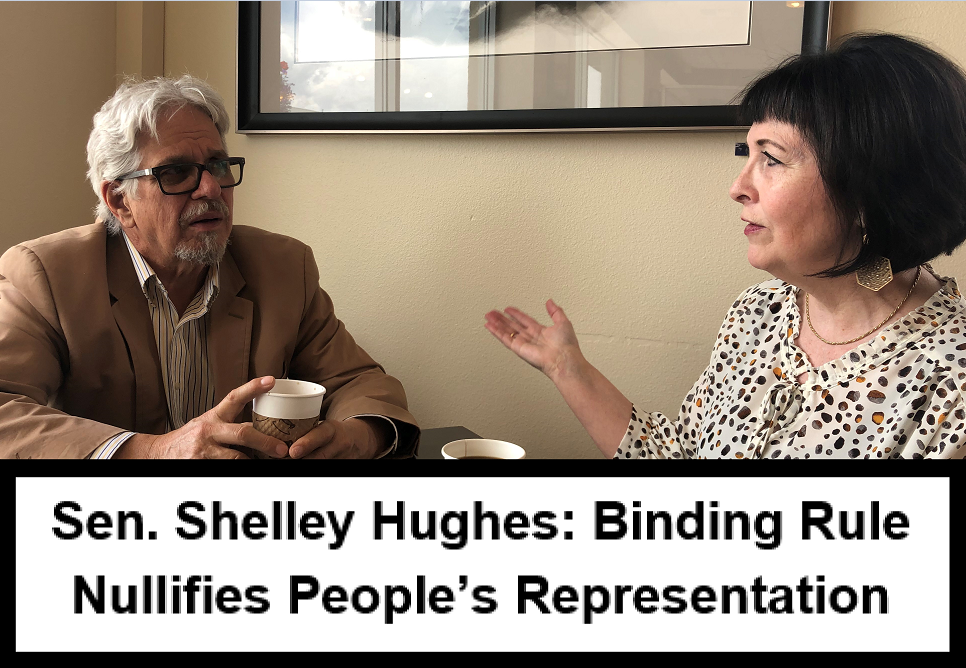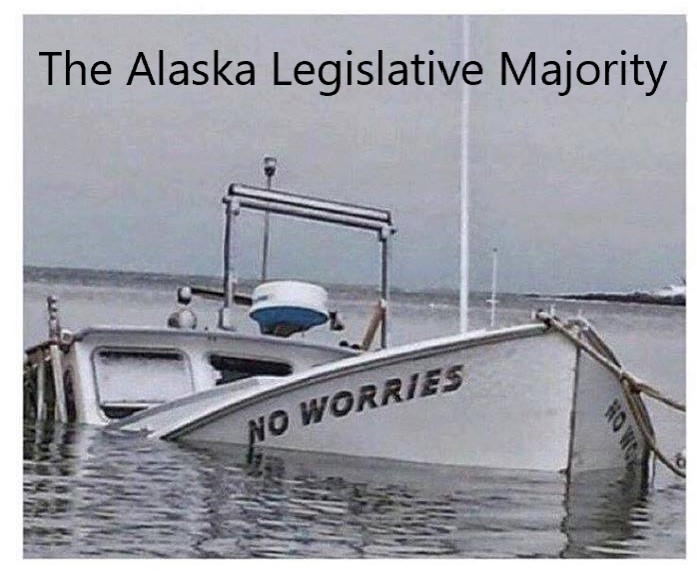Who does the Alaska Legislature Really Represent?
The Alaska Economy is staggering like a weakened 11th round boxer, from a half-year Coronavirus Pandemic bout, but the Alaska Legislature made no attempt in Juneau to stop the move of $4 Billion from the Permanent Fund Earning Reserve Account (ERA) to the untouchable principal of the fund at
the end of this month. Alaskans won’t know if this was a smart move until the ref either raises our hands to the sky or we wake up on our back.
Conversations were held last session, in 2019 in which Sen. Bert Stedman (Sitka) wanted to transfer $12 Billion from the ERA and put it into the principal, explained Sen. Shelley Hughes. Some of us felt that was too much and pushed back, so the amount was reduced to $9 Million. Gov. Michael Dunleavy then vetoed $5 Billion so the final number to be transferred and locked up in the principal was $4 Billion; that lock up is due to occur this June 30th.
These were the circumstances of this decision: Upon having our very first briefing with Chief Medical Officer, Dr. Anne Zink, in early March, I realized we did not know how things would shake out, what was going to happen to the economy, explained Hughes. And, knowing oil prices are volatile and could fall (and they indeed did in April to –$2.68 at one point), I said to my fellow Majority Caucus members: “I think we should look at reversing that transfer from the ERA.” I had gotten amendment language from our Leg Legal attorneys (Division of Legal and Research Services) so we could reverse the lock-up of the $4 billion.”
I suggested to my fellow caucus members that we could add an economic trigger so when things stabilize and oil prices go up, the transfer could proceed. Holding those funds back during this time of unpredictability seemed the prudent thing to do. It would at least provide a fiscal slope
instead of a cliff when the legislature returned next January to craft the next budget.
 |
| Sen. Shelley Hughes |
Some looked at me as if I was looney, out to lunch, and I said: “We don’t know, this
could be like the Great Depression, a real hit on Alaska families,” added
Hughes. Since then a number of legislators have come around, and many
community leaders have agreed it would be the right thing to do. But they all
came around too late—we would have to have a special session before June 30th
to stop the lock-up of the $4 billion.
For background: The Alaska Permanent Fund is divided into two parts: Principal (non-spendable) and Earnings Reserve (spendable), both of which are invested using the same asset allocation. The Alaska Constitution articulates that the Principal shall only be used for income-producing investments. The Earnings Reserve account, established in Alaska Statutes, is available for
appropriation.[1]
The Math is Undeniable
As of April 30 the total Permanent Fund Value was $62,575,7000,000 with the Principal at $45.4 Billion and the ERA at $17.2 Billion. The annual PFD is supposed to be paid out of the ERA to every Alaskan according to a formula set in statute,2, 3 but the formula has not been followed since 2015. The Percent of Market Value (POMV) draw to provide for government services and the partial PFD in this year’s budget is $3.1 billion. Next year the estimated POMV draw is $3.0 billion. Those two POMV draws together with the locking up of $4 billion into the principle from the ERA equates to roughly $10 billion of the $17.2 billion obligated, leaving $7.2 billion.
Hughes continued: Although the ERA will continue to grow, we never know for sure what the markets may do. Another POMV draw or two eats that ERA up. And what about PFDs which are part of our annual economic cycle in Alaska? This is the basis of my concern. This is why I thought it prudent to reverse the $4 billion transfer from the ERA to the principal. Once those funds are transferred, it’s hands-off. The principal is constitutionally protected.
How Sen. Hughes Views the Current Situation
I believe this is a very critical juncture because oil prices have taken such a hit, what has happened to our economy due to Covid19, and the fact our savings are mostly gone. We are facing more than a $1 Billion gap in the budget. This means very serious decisions must be made, stated Hughes. We don’t have time to kick the can down the road. We have to solve this gap; we don’t have spare change sitting around we can grab.
She believes the ability to interact in a variety of ways with elected members of Alaska’s legislature means more information about the people’s business conducted in Juneau can be known by voters, but how Alaskans influence their elected officials to do what is best for the state is critical. Hughes represents Mat-Su/Anchorage Senate District F in the legislature.
Constituent work doubles as a Senator because you are representing an area which includes two house districts, Hughes explained during a recent Palmer coffee house interview. I am very committed to the concept of a Representative Republic, so I really do try to keep my ear to the ground and stay very
connected to my constituents. And because I have an incredibly engaged district, I receive hundreds of contacts on a daily basis. With social media and Messenger, people have additional ways too of reaching out to me with concerns or insights, and trust me, they reach out!
For more about the mechanics of how the Alaska Legislature works go to: https://donnliston.net/2018/12/what-you-need-to-know-about-how-alaska.html
The primary concern of legislators at this time in Alaska’s history is the State budget. The legislature is the appropriating body. The issue is whether they are able to find a glide path to long-term government sustainability or risk further damaging a frail economy reeling from a pandemic by excessive spending.
This day has been coming for several years but many seem to believe we can ultimately use the Permanent Fund to continue doing what we have been doing since oil started flowing down the Trans-Alaska Pipeline from Prudhoe Bay to Valdez in 1977. Others believe the Permanent Fund is a legacy to future generations of Alaskans from development of non-renewable fossil fuel and the ERA is all we have to pay for State government and PFD payouts.
Hughes continued: I think one of my strengths is that I am good at building consensus without compromising my conservative values. I am good at listening to people who don’t agree with me; I look for points of agreement, and I am very often quite successful finding them.
I think the people of my district want to see a very efficient and effective government. They don’t want to see waste, they don’t want to see bloat, because if we don’t control spending, government will be going after their wallets. This is the time more than ever to streamline government. That is the reason I have been adamant about seeking a thorough statewide audit, said Hughes.
I believe our process is flawed. We are talking about decisions being made on a multi-billion dollar budget in 90 days by a handful of people on the Finance Committee – who are also hearing many policy bills, who have constituent issues to manage, who have multiple meetings to attend in their offices with those who fly to Juneau, continued Hughes. There are simply not enough hours in a day for the committee members to get into the weeds to fully understand what needs to be done. We have a legislative auditor but she’s not been equipped to do what I’m proposing.
Some might say the result of continuing to do things the way we have done then will be more of the same, but the Alaska Gold Rush ended in the early 1900s and our Alaska Oil Rush is also subsiding. We must determine our priorities and gear government to needs over wishes. One other state has developed what Hughes calls a “sunset commission” to take a hard look via in-depth audits at government division by division, and determine what are the required functions and what can be eliminated, what can be combined, what may need to be enhanced?
Hughes explains: I am taking some of the concept from a Texas initiative and changing it up so that we would have an independent commission, with people from the private sector who know how to deal with large budgets and operations—CEOs and people with CPAs, those with other financial experience—to establish a Sunset Commission. All departments and divisions would rotate through review on a regular cycle. A division would sunset unless the legislature gives its stamp of approval to continue. This would mean the audit could not sit on the shelf; the legislature would have to take it up and take action.
The commission would be tasked to examine the facts to determine whether the agency is meeting its statutory and constitutional obligations with the goal of remaining politically neutral. Are the staffing levels appropriate or could it meet its duties with fewer, or perhaps an office is understaffed and causing an inefficiency down the line? Are the dollars being well spent? Are Alaskans getting the bang for the buck? There could be some things that were put into place 30 years ago that no longer apply. Through this process we can determine if certain practices can be improved. We can help ensure our state government is a lean, mean machine – efficient and effective.
What about the Way our Legislature Operates?
Elected legislators determine for themselves the rules under which they will do the people’s business when assembled in Juneau, but this is the law about how it will happen:
Sec. 24.05.120. Rules. At the beginning of the first regular session of each legislature, both houses shall adopt uniform rules of procedure for enacting bills into law and adopting resolutions. The rules in effect at the last regular session of the immediately preceding legislature serve as the temporary rules of the legislature until the adoption of permanent rules. These rules are available online for constituent review.[4]
No place in those rules is there a provision for a Binding Caucus. Lately the practice of having a Binding Caucus has been questioned as a corrupt way to deny a large portion of Alaskans their due representation by organizationally diminishing legislators sent to backwater Juneau.
I believe the Binding Rule flies in the face of a Representative Republic, Hughes declared. For example, it is illegal right now for me to take a campaign donation–between now and November–and promise to vote for something in return. However, after November I can promise to vote for something and get something of value for my vote; a committee chairmanship, or a seat on the Finance Committee.
The Binding Rule requires someone to promise in advance, over a two-year period, to vote for something two years out—that they have never laid eyes on—the capital and operating budgets, as well as promising to uphold rulings of the presiding officer, procedural votes, explained Hughes. Some people think “Oh, procedural votes are just housekeeping,” but they are not. They are verypowerful, and impact not just budgetary decisions but also directing policy.
Instructional note:
Elected legislators go to Juneau and organize themselves into majority and minority caucuses. This occurs after the Lieutenant Governor swears everybody in and they vote for who will be the temporary and ultimately the presiding officer; Speaker in the House and President in the Senate. The party of the elected presiding officer determines who among the group will be in the Majority Caucus, which runs the show. The Minority Caucus is the loyal opposition.
The Binding Caucus is a creation of the Majority Caucus, designed to assure discipline, but more than that it has become a means for punishing black sheep who attempt to cut our ever-growing state budgets. This is also one technique for creating Majority Coalitions run by members of the minority who ran under a false flag and gain positions on the amalgamated Majority Coalition. This in turn disallows some legislators who do not adhere to absolute rule of the chair, denying meaningful participation in a process they
were elected to engage in by tens of thousands of Alaskans in their districts.
If you aren’t in the Majority, it is less likely your bills go through, you get less staffing, and your influence is reduced, continued Hughes. It requires five people to form an officially recognized minority, so if just a few people choose to not be in the majority they may not even get a seat on any committee, technically. Leadership would have the flexibility to assign one if they wanted, but you are thwarted in terms of representing your district by being assigned fewer seats on committees and no committee chairmanship.
Hughes is not the only Senator who was recently punished by the Senate President for standing on principle.
Sen. Mike Showers, Sen. Mia Costello, Sen. Lora Reinbold and I are now essentially a minority within the Majority Caucus, Hughes continued. During the last two years Sen. David Wilson and Sen. Peter Micchiche were often grouped with us, and Senator Micchiche took some punishments along with the four of us. Communication has been poor. We would hear things through the media, for instance, instead of from our own senate leadership, or we would hear it from a Democrat. It was bizarre.
There are other consequences of not being intimidated by a bully and instead voting on behalf of the people a legislator represents: Before January 21, I was allotted funding for four staff, and now I am down to two. These two took the equivalent of a $20,000 annual pay cut recently because of another “punishment” decision by Senate President Cathy Giessel and the leadership.
To lessen the blow to my staff – I don’t believe they should be penalized for my votes and positions – I put in a request for a sharing arrangement of one of my staff with another Mat-Su Representative, said Hughes. This would have helped restore most of the salaries of both of my staffers. This request was denied. I should note that other presiding officers in the past have signed off on such an agreement.”
Recently too, I along with a few other colleagues were denied access to the four majority-wide staff experts as yet another punishment, continued Hughes. I can no longer reach out to these fine staffers as a resource in the areas of 1) oil and gas, resource development; 2) judiciary, legal and court decisions; 3) polling, surveys, majority website assistance; and 4) communications and press releases.
I want to say that it sounds like I’m whining. I’m not. I absolutely disagree with all the “punishments” that have been doled out, said Hughes. I believe they were wrong and should not have occurred. I am telling you now about them because it is important for Alaskans to understand how the Binding Caucus Rule works so they can decide if it is a practice we should allow to continue.
Hughes continued: I believe the Binding Caucus is un-American. Some think that is overly harsh. I do not. It is unethical at its core and denies the constituents we serve the representation afforded them in the constitution. At minimum, it falls within the spirit of the law as far as the elements required to determine Bribery.[4]
We live in such a wonderful state. I am incredibly honored to represent the people of my district, but every candidate running for the legislature during this election campaign needs to be asked if they support
continuation of the Binding Caucus Rule. Every voter needs to know where the candidates stand on this pivotal issue before they walk into the voting booth. Do they want to send someone to Juneau who is okay with promising votes in advance on bills, budgets, and policies, sight unseen? I am quite confident
that Alaskans do not.
We can right the ship we’re on as Alaskans work together to eradicate this archaic rule so they are truly represented. I know we can get through the present stormy seas to solve Alaska’s fiscal problem, to settle the PFD issue, to address other challenges before us – I have great hope for the future!
Sen. Shelley Hughes
References:
[1]Alaska Permanent Fund Corporation
https://apfc.org/frequently-asked-questions/#how-does-the-Fund-work
[2] Alaska Permanent Fund Corporation Home Page
[3] AS 43.23.025. Amount of dividend.
(a) By October 1 of each year, the commissioner shall determine the value of each permanent fund dividend for that year by
(1) determining the totalamount available fordividendpayments, which equals
(A) the amount of income of the Alaska permanent fund transferred to the dividend fund under AS 37.13.145(b) during
the current year; (B) plus the unexpended and unobligated balances of prior fiscal year appropriations that lapse into the dividend fund under AS 43.23.045(d); (C) less the amount necessary to pay prior year dividends from the dividend fund in the current year under AS 43.23.005(h), AS 43.23.021, and AS 43.23.055(3) and (7); (D) less the amount necessary to pay dividends from the dividend fund due to eligible applicants who, as determined by the department, filed for a previous year’s dividend by the filing deadline but who were not included in a previous year’s dividend computation; (E) less appropriations from the dividend fund during the current year, including amounts to pay costs of administering the dividend program and the hold harmless provisions of AS 43.23.240;
(2)determining the number of individuals eligible to receive a dividend payment for the current year and the number of estates and successors eligible to receive a dividend payment for the current year under AS 43.23.005(h); and
(3) dividing the amount determined under (1) of this subsection by the amount determined under (2) of this subsection.
[4]Uniform Rules of the Alaska Legislature
http://akleg.gov/docs/pdf/uniform_rules.pdf
[5]Findlaw Criminal Charges for Bribery
https://criminal.findlaw.com/criminal-charges/bribery.html
Elements of a Bribery Charge
At the most fundamental level, charges of bribery need only to prove that an agreement for the exchange of something of value (political influence, for example) for a sum of money or something else of value. While a written agreement isn’t
required, prosecutors must be able to prove that an agreement was actually made.
For example, a taped phone call between a politician and the party offering the bribe may be sufficient evidence. Similarly, a police body cam video of a driver handing the officer cash before being let go would suffice.
The federal government, however, has very specific elements that it uses to prosecute cases of bribery against federal employees. These include the following:
1. The individual being bribed is a “public official,” which includes rank-and-file federal employees on up to elected officials;
2. A “thing of value” has been offered, whether it’s tangible (such as cash) or intangible (such as the promise of influence or official support);
3. There’s an “official act” that may be influenced by a bribe (such as pending legislation that may have a direct impact on the party offering the bribe);
4. The public official has the authority or power to commit the official act (for instance, the official is a senator who is voting on a particular piece of legislation);
5. There must be the establishment of intent on the part of the bribing party to get a desired result (the intent to sway the vote by handing over an envelope full of cash); and
6. The prosecution must establish a causal connection between
the payment and the act meaning there must be more than just a suspicious coincidence.






